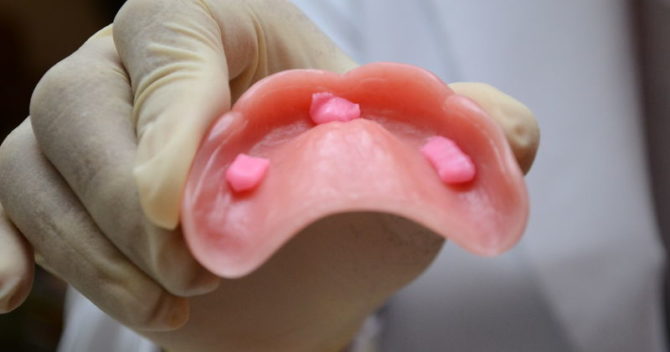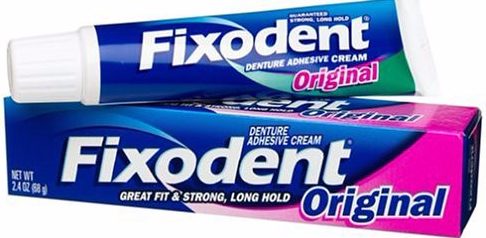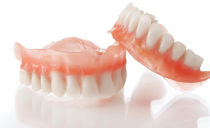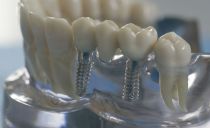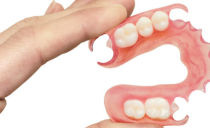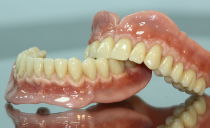Means for fixing dentures: which cream, glue, gel is better
Adhesive for dentures is a special tool for fixing and stabilizing an orthopedic product in the oral cavity. Using glue, the patient can not worry about the possible mobility of the prosthesis during a conversation or eating. However, in addition to adhesives, which are available in the form of gels and creams, other fixing agents are also sold in stores: dental pads, powders. That it is better to choose this or that consumer, and will be discussed in the article.
Content
What is prosthetic glue, what is it used for?
The fixation of removable dentures occurs due to anatomical retention - the correspondence of the shape of the inner surface of the product to the anatomical features of the jaw. When a person puts on a prosthesis, a vacuum is created between the structure and the jaw, which holds the base. However, with prolonged wearing of prostheses, many people experience atrophy of the alveolar processes, which reduces the strength of fixation of orthopedic products.
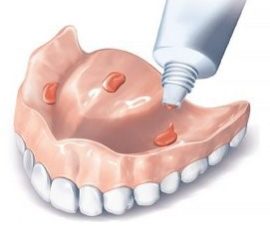 Dentists recommend fixing dentures using fixing creams and gels, especially the use of such funds in the complete absence of teeth. They increase the vacuum between the mucous membrane of the gums and the structure and thereby hold it securely.
Dentists recommend fixing dentures using fixing creams and gels, especially the use of such funds in the complete absence of teeth. They increase the vacuum between the mucous membrane of the gums and the structure and thereby hold it securely.
Special fixing glue is available in the form of a cream, gel, paste. The advantages of such tools include:
- strong fixation of the structure to the gingival mucosa;
- holding the prosthesis while smiling, talking, eating;
- product stabilization;
- protection of the mucosa from rubbing, damage, inflammation;
- hypoallergenicity;
- biocompatibility with the body;
- uniform distribution of the load on the gums;
- lack of a specific taste and smell;
- psychological comfort of the patient;
- lack of fear that the prosthesis may become mobile at the wrong time;
- can be used for all types of structures (plastic, nylon).
Cream or gel for fixing dentures - differences
Creams and gels practically do not differ from each other, the difference between them is only in consistency. Creams are dense and viscous, and gel products have a greater fluidity, due to which they are superimposed with a thinner layer.
At the initial stages of applying the prosthesis, it is better to use fixing agents in the form of a cream, as they provide an easier and more comfortable addiction. In addition, gels are quite difficult to dose and distribute on the surface of the prosthesis.
Popular brands of fixing creams and gels for dentures
According to many dentists, the best and highest quality creams for fixing dentures are R.O.C.S, Corega, President, Protefix, Lacalut DENT, Fittydent.
R.O.C.S
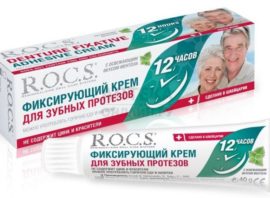 The fixing agent "Rocks" of Russian-Swiss production ensures reliable fixation of the structure for 12 hours. The manufacturer claims that product effectiveness R.O.C.S does not change under the influence of high or low temperature. It is evenly distributed on the mucosa, hermetically holds the base, prevents food from getting under the product.
The fixing agent "Rocks" of Russian-Swiss production ensures reliable fixation of the structure for 12 hours. The manufacturer claims that product effectiveness R.O.C.S does not change under the influence of high or low temperature. It is evenly distributed on the mucosa, hermetically holds the base, prevents food from getting under the product.
Cream "Rox" contains mint and menthol, so it freshens the oral cavity and eliminates bad breath. Does not contain dyes, zinc, harmful substances. Such glue can be used to install wet prostheses, it does not wash out and does not dissolve throughout the day. The disadvantages of the product include a thick consistency and high cost.
Korega
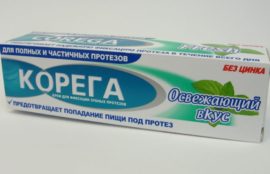 "Korega" is a cream for artificial teeth, used for full and partial adentia. The product prevents food residues from getting under the product, firmly fixes the prosthesis, holds it for a long time on the alveolar processes and is convenient to use.
"Korega" is a cream for artificial teeth, used for full and partial adentia. The product prevents food residues from getting under the product, firmly fixes the prosthesis, holds it for a long time on the alveolar processes and is convenient to use.
The Korega glue contains no harmful substances, it does not cause an allergic reaction, tastes good, and can be applied to wet prostheses. The disadvantages of the tool include its instability to high and low temperatures, susceptibility to leaching with liquid, rapid consumption.
"The president"
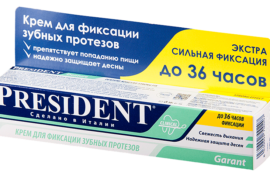 Cream for fixing dentures "President" is one of the most high-quality and effective. A few seconds after application, the fixative forms a dense elastic layer on the surface of the plastic between the base and the mucosa. Product benefits include:
Cream for fixing dentures "President" is one of the most high-quality and effective. A few seconds after application, the fixative forms a dense elastic layer on the surface of the plastic between the base and the mucosa. Product benefits include:
- excellent fixation;
- affordable cost;
- large volume of tube;
- protection from food under the prosthesis and mucosal damage.
The disadvantages of the “President” retainer include a rather strong specific taste, a slight decrease in the strength of fastening after eating hot food, and the presence of flavorings in the composition.
Protefix
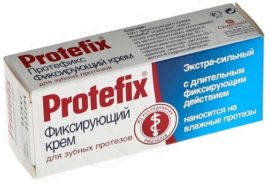 Cream “Protefix” provides a durable fastening of an orthopedic product to the gums for 10-12 hours. The product is available in three versions: without additives, with the addition of mint or aloe. The advantages of Protefix cream include economical consumption, easy use, good fixing properties, even distribution, the ability to use with increased salivation. The cream is not washed with saliva and liquid products.
Cream “Protefix” provides a durable fastening of an orthopedic product to the gums for 10-12 hours. The product is available in three versions: without additives, with the addition of mint or aloe. The advantages of Protefix cream include economical consumption, easy use, good fixing properties, even distribution, the ability to use with increased salivation. The cream is not washed with saliva and liquid products.
The disadvantages of Protefix include an uncomfortable bottle and dispenser, the risk of leakage of the product, a decrease in the strength of attachment when drinking very hot drinks.
Lacalut dent
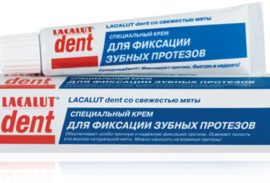 Lacalut is another good glue for artificial teeth and full dentures. It is produced by a German company. The manufacturer promises to fix the orthopedic structure for at least 24 hours, but in fact it lasts a little less.
Lacalut is another good glue for artificial teeth and full dentures. It is produced by a German company. The manufacturer promises to fix the orthopedic structure for at least 24 hours, but in fact it lasts a little less.
Lacalut DENT cream creates a thin layer between the structure and gums, protects the tissues of the oral cavity from rubbing and damage, helps to adapt to a new prosthesis, does not cause discomfort. In addition, the benefits of the product include excellent fixation, pleasant taste and smell. The disadvantages are the high cost and a slight decrease in the fastening strength when using hot products.
Fittydent
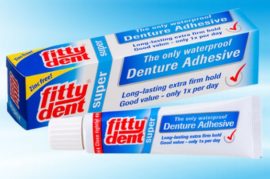 Fittident is on the list of the most effective fixative agents. It has no specific taste and smell, it attaches the base well, and has a long-lasting effect. Fittydent has a viscous consistency and is applied only to a dry prosthesis. The disadvantages of the product include an increase in gum sensitivity in some users.
Fittident is on the list of the most effective fixative agents. It has no specific taste and smell, it attaches the base well, and has a long-lasting effect. Fittydent has a viscous consistency and is applied only to a dry prosthesis. The disadvantages of the product include an increase in gum sensitivity in some users.
The manufacturer of glue “Fittent” recommends applying the product to the structure, wait 20 seconds until it dries a little, and only then fix the prosthesis in the oral cavity.
"Fixodent"
The best gel for fixing dentures is Fixodent. The product has a viscous consistency, provides a strong base attachment in the mouth throughout the day. The preparation does not contain dyes, bleaches and other harmful substances. The tube is equipped with a convenient tip for applying and using the gel.
What cream, gel for fixing dentures is better
It is better to choose a cream for fixing a denture in dentistry, since only a doctor can take into account all the individual characteristics of the patient.
People prone to allergic reactions should choose products without additives and flavors.It should also be borne in mind that the duration of fixation will be shorter than the manufacturers claim, and that the fixing property of all creams decreases with the use of hot foods or drinks.
When choosing a means for fixing dentures, the following factors must be considered:
- fixation duration;
- efficiency;
- the presence in the composition of harmful substances, additives, dyes, flavorings;
- lack of zinc, since with a constant presence in the oral cavity, the trace element becomes toxic to the body;
- the consistency of the substance;
- the ability to use on dry and wet surfaces;
- tissue protection;
- dissolution in the oral fluid;
- tube size;
- the presence of taste and smell;
- Ease of use;
- cost;
- manufacturer popularity.
How to wear and remove a prosthesis
Fixing removable dentures using additional fixation tools must be carried out taking into account the recommendations of the doctor and in accordance with the instructions for use. Principles for the proper use of creams and gels:
- The prosthesis should be thoroughly cleaned and dried before fixation. Cleaning can be done with a paste, soap solution and brush.
- Glue must be applied along the lines indicated in the instructions. The correct amount of cream can be determined by gradually increasing the amount of the product: if the gel or cream protrudes from under the base, then it is applied in an excessive amount, which must be removed with a napkin.
- The removable structure is placed in the oral cavity and pressed against the gums for 40 seconds.
- After fixing the structure, do not eat food for 20 minutes. When using fixatives, you should not eat hot dishes and drinks.
- Before removing the structure, thoroughly rinse the oral cavity with water, slightly rock the product.
- After use, the prosthesis must be thoroughly cleaned of the remnants of the cream, rinsed and dried.
It is recommended to use the cream once a day. With frequent use, side effects may occur in the form of stomach diseases, irritation, allergic reactions, neurological pathologies.
Fixation of dentures with a gel in the complete absence of teeth is carried out in the same way as with a cream. But since the gels have a less viscous consistency, they must be applied in a thinner layer. Dentists recommend applying the gel to the inside of the structure, and then wait about 30 seconds for the product to dry out slightly in the air. Only then can the prosthesis be placed in the oral cavity.
Types of other fixative products for dentures
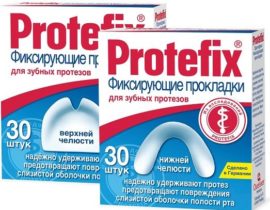 In addition to glue, pads and powders can be used to fix dentures. The composition of the dental pads includes a filler made of fiber, which acts as a fixing element. Typically, such tools are used when attaching the prosthesis to the lower jaw, since for the upper they are not too reliable - the prosthesis can fall out.
In addition to glue, pads and powders can be used to fix dentures. The composition of the dental pads includes a filler made of fiber, which acts as a fixing element. Typically, such tools are used when attaching the prosthesis to the lower jaw, since for the upper they are not too reliable - the prosthesis can fall out.
Dental powders are used in the same way as glue: they are poured onto the prosthesis, after which the product is fixed in the mouth. The disadvantage of the tool is the difficulty of uniform distribution over the orthopedic design.
Contraindications and side effects of fixing agents
Fixing agents are contraindicated in the presence of hypersensitivity to their components. Also, they should not be used in the presence of acute dental inflammatory diseases, the manifestation of side effects, the expiration date.
You should choose products without zinc, since it negatively affects the body, has a toxic effect and can cause neurological pathologies. Other side effects - weakness, headache, stomach pain - can occur with excessive use of fixative devices.

